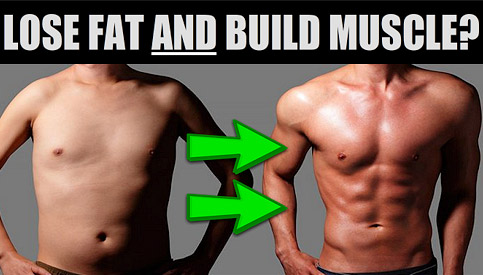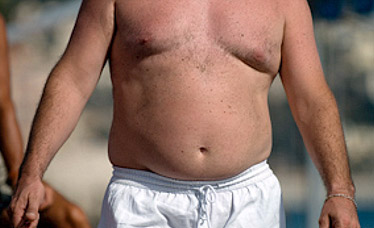THE TRUTH ABOUT “RECOMPING” (IS IT REALLY POSSIBLE?)

In this article, I’m going to be covering the truth about body recompositioning, better known as recomping (building muscle and losing fat at the same time).
Is recomping possible? Who can do it? Is it more efficient to go that route in comparison to standard bulking and cutting cycles?
Naturally, the first question you might have is regarding whether it’s actually possible to build muscle and lose fat simultaneously.
The short answer is, yes, it is possible.
However, it’s going to vary quite a bit from person to person in terms of just how far in both directions they can travel at once.
The three most important factors to take into account for recomping are:
- Training experience
- Body fat percentage
- Genetics
The 4 Scenarios Where Recomping Is Realistic
#1: Beginner Lifters

The less training experience that someone has, the more likely it’ll be that they can recomp successfully and vice versa.
Why? Because weight training will still be a new stimulus for their body.
In this situation, the body is more sensitive to weight training and will adapt in a more pronounced way.
The amount of muscle that any given person can gain, and how fast they can gain it, is directly proportional to how much total muscle they’ve built so far.
A brand new lifter is going to gain muscle faster than somebody who has already been training properly for one year or more.
After about three to five years of consistent training, once you’re right up near your maximum genetic potential, muscle growth is going to slow down dramatically to the point where it might take a year or even longer just to gain an extra pound or two of muscle mass.
With all of that being said, training experience is a huge factor that will determine whether if and how effectively body recomping will work.
#2: Overweight

The second factor is going to be body fat percentage.
People who have a higher body fat percentage are going to be able to recomp more effectively than people who are already relatively lean.
Since body fat is a stored form of energy, your body can use the energy in stored fat to fuel the muscle-building process.
If you’re thirty percent body fat right now, your body already has plenty of extra stored fuel available that it can use to support muscle growth even if you’re eating in a calorie deficit.
Whereas, if you’re already relatively lean as is (<12% body fat) your body is going to be fighting a lot harder to hold on to that remaining fat since your body needs a certain amount of body fat for health and survival purposes.
Your body is already trying to conserve energy as is, and it’s not just going to readily burn off that last bit of fat in order to build more muscle, especially since muscle is calorically expensive tissue.
To keep things simple:
- The higher your body fat is, the more muscle you can gain in a calorie deficit.
- The lower your body fat is, the less muscle you’re going to be able to gain while in a calorie deficit.
If you’re trying to get down to very low body fat levels, then you’ll actually start losing muscle when you try to cut further.
#3: Returning From A Training Layoff

The third scenario is for lifters who are returning from a training layoff.
In this case, recomping is also possible even if you’re a more experienced lifter. After a training layoff, you’re going to have the benefits of muscle memory on your side.
Muscle memory seems like a myth, but it’s a very real phenomenon.
Your muscles ‘remember’ that they were once bigger, and can grow to that previous size much faster than muscles that haven’t experienced significant hypertrophy before.
Your body can build muscle and lose fat fairly easily in those first several weeks back in the gym after a layoff.
#4: Enhanced Lifters

If you are ‘enhanced’, meaning you’re using performance-enhancing drugs, then obviously that’s going to change things as well.
If you’re enhanced, successfully recomping is much easier.
Keep in mind that this blog is dedicated to natural lifters. The vast majority of people reading this article are probably natural, and so these points are directed to someone who doesn’t use PEDs.
In terms of the practical application here, the people who are going to be able to recomp most successfully are beginners who are also carrying higher body fat levels. In other words, either you’re overweight or you’re skinny fat.
The other factor to pay attention to here is genetics. The reality is that genetics do play a significant role in the muscle-building process.
Genetics dictate a range of important factors in the muscle-building process such as:
- Testosterone levels
- Growth hormone
- Insulin sensitivity
- Nutrient partitioning
- Myostatin levels
All of these factors come together and will influence just how effectively any given person can lower their body fat while putting on lean mass at the same time.
What If I Don’t Fit Into One Of These 4 Recomping Categories?

Aside from the inclusion of drugs, or in the case of somebody returning from a training layoff, being overweight and/or being a beginner are the two most influential factors that will determine whether you can successfully build muscle and lose fat at the same time.
The truth is that if you’re not overweight, a beginner, or coming back from a training break, then you’re usually not going to see significant progress in both directions simultaneously.
This is especially true if you’re very lean and/or are an experienced lifter.
Imagine a more experienced lifter who’s coming off a bulk at 18% body fat, who’s now ready to cut.
Yes, if he structures his program properly, then he might still continue to gain some muscle and strength while also dropping his body fat down to 12%.
But it’s not going to be to the same degree that he would have experienced if he was new to lifting and/or in a calorie surplus.
On paper, this person can say, “yeah, I lost fat and gained muscle at the same time,” but it’s probably going to be mostly fat loss and maybe a small amount of muscle gain.
Technically he did recomp during that time, but it was still primarily just a cutting phase.
Another thing to keep in mind is that you can gain muscle while you’re in a calorie deficit. But remember that we’re not talking about getting shredded (lower than 10% body fat), which almost guarantees some degree of muscle loss.
You can gain muscle in a deficit, but it won’t be to the same degree that you’d achieve by eating in a calorie surplus.
The question “is body recomping possible” has no simple answer, as it depends on multiple variables.
Some people will say you can gain muscle in a deficit or at maintenance as long as you eat enough protein. Therefore, you don’t actually need a surplus and bulking is a waste of time.
Well, true, you don’t need a surplus to build muscle in the basic sense. But if you want to build muscle as effectively as possible then, yes, you probably do need to be in a small surplus.
So for that reason, if you’re already lean, say, 12% body fat give or take, and your primary goal is to gain muscle size and strength, then I’d recommend just going with a standard lean bulk.
You can lean bulk by eating in a small calorie surplus in order to maximize gains.
Overall, you’re never going to lose body fat while in a calorie surplus. Period. So, true recomping is out of the question at that point. But your strength is going to increase faster, and you’re going to gain more overall lean mass with that surplus in place.
The Importance Of Lean Bulking

If you do a lean bulk properly, and you do it with patience, you won’t gain a lot of fat.
You will gain some body fat, but you can easily do a quick mini-cut and lean down again.
In the bigger picture, you are gaining muscle and losing fat. It’s just not happening at precisely the exact same time.
To get the most out of lean bulking, you have to do it properly.
A proper bulking phase is done slowly and gradually. It only takes a relatively small calorie surplus in order to maximize muscle growth in the first place.
Most lifters make the mistake of overdoing their surplus, and this is why a lot of people get scared of the idea of bulking due to the fear of excessive body fat gain.
The bottom line is that your body can only use a limited number of calories for the purposes of muscle growth on any given day. Once you exceed that number, the rest of the available calories will be stored as fat.
You do NOT need 1000, 750, or even 500 extra daily calories to maximize muscle growth.
Most of that will end up as fat, especially as you get more advanced.
Guidelines for lean bulking calories:
- Beginner lifters: Beginners can go with a surplus of about 300 calories above maintenance per day.
- Intermediate lifters: Intermediate lifters (people with less than one year of proper training experience) should go with about 200 – 250 calories above maintenance per day.
- Advanced lifters: More advanced lifters at three years experience and beyond should go with around 100 – 150 calories above maintenance.
These figures are just approximate figures to go by, and they’re never going to be perfect.
But that should provide enough calories to optimize muscle growth while keeping fat gains to a minimum.
I do recommend eating in a calorie surplus in order to maximize your gains, but keep in mind that if you’re already relatively lean and want to gain strength and mass, you still shouldn’t be gaining an excessive amount of fat during your bulk.
If you do things right, then you’ll gain muscle along with a small amount of fat.
Then, you can go back to a deficit again to get rid of the fat while preserving the gains that you made. Finally, you can lean bulk again with a small surplus, go back to a deficit, and so on, until you achieve your desired physique.
I know that this is a lot of information to take in, so to summarize everything…
Yes, it is possible to build muscle and lose fat at the same time.
However, it will usually only happen to a truly significant meaningful degree in beginners who are also carrying a decent amount of extra body fat.
The only other two exceptions are people coming back from a layoff or those using performance-enhancing drugs. Genetics will also highly influence just how successful your recomp is.
Recomping Summary
Successful recomping is achieved by:
- Eating in a calorie deficit
- Consuming enough protein
- Regular weight training
As you lose fat, you should be able to gain some muscle mass at the same time.
There’s no guarantee as to exactly how much muscle you’ll gain, as this outcome will depend on your body fat percentage and genetics.
The bottom line is that you should put your primary focus on fat loss.
As long as you’re in a moderate caloric deficit, eating enough protein, and training regularly, you will be giving your body the tools it needs to recomp to the best degree that it can.
After achieving a lean body fat percentage (12 – 14% for men and 12 – 19% for women), you can switch gears and shift into a focused lean bulking phase.
If you found this article helpful, make sure to sign up for your FREE custom fitness plan below...




